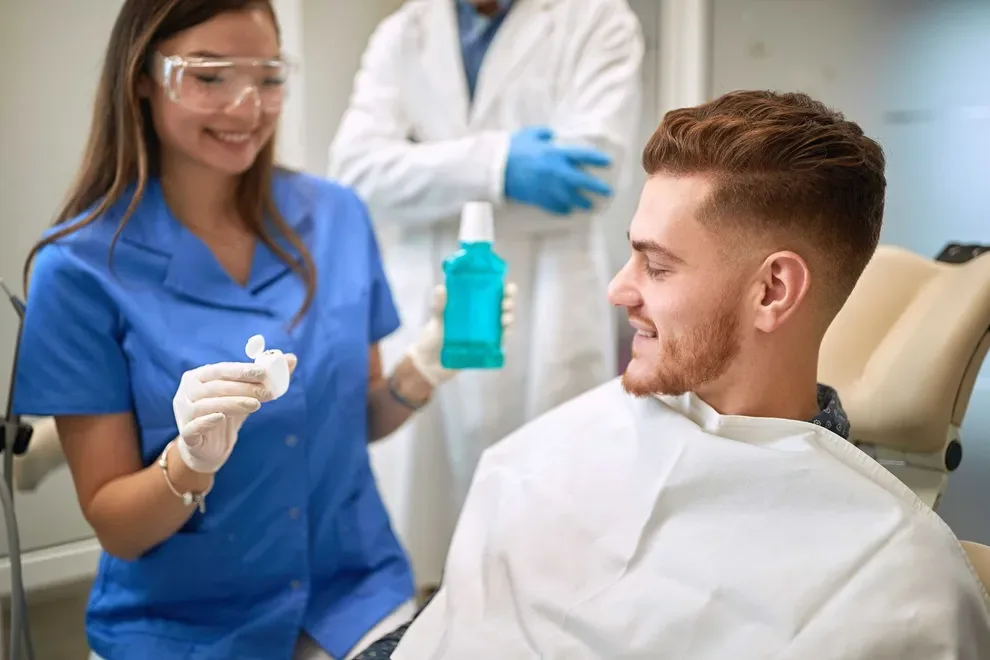Why Your Mouthwash Burns: Effective Alternatives

Table of Contents
- Burning for Fresh Breath
- Why Does Mouthwash Burn
- Alternatives to Alcohol-Based Mouthwash
- Mouthwash Should Not Hurt
- Frequently Asked Questions
- References
Mouthwashes burn because of alcohol or a flavoring agent like menthol. They may also burn because of a prescription medication in the therapeutic mouthwash.
If you dislike the burning sensation, you can dilute the mouthwash or use an alcohol-free alternative.
Mouthwash: Burning for Fresh Breath
Mouthwash, or mouth rinse, helps to freshen breath. As part of an oral hygiene routine that includes brushing and flossing, mouthwash can remove some food particles and reduce bacteria in the mouth.
Most commercial brands of mouthwash contain a type of alcohol, which can provide a little health benefit by killing bacteria, but is mostly designed to cover bad breath. Some types of mouthwash, especially prescription mouthwashes, may contain other ingredients like fluoride, which help to strengthen teeth and considerably improve oral health.
Mouthwash is not a replacement for proper brushing and flossing, although you can use it before social engagements to improve your breath. Be sure to swish the mouthwash in your mouth for at least 30 seconds or as directed on the packaging.
If your mouth burns after using mouthwash, this does not inherently mean it is working. It simply means that the mouthwash contains some alcohol. You can dilute the mouthwash to get fresh breath with less of a burning sensation.
Why Does Mouthwash Burn?
Most commercial mouthwashes contain alcohol, which can be a sterilizing agent and reduce harmful or breath-killing bacteria. However, this alcohol can be problematic if enough of it is swallowed. If you have children or are trying to avoid alcohol, there are some alcohol-free mouthwash options that might work better for you.
Some brands of mouthwash advertise that the burning sensation means their product is killing germs, but this is not true. Over-the-counter mouthwashes typically do not kill enough bacteria in your mouth to be considered therapeutic; they are instead considered cosmetic.
While they can be a good addition to brushing and flossing your teeth or a temporary solution to bad breath between brushings, they are not a replacement. Even therapeutic mouthwashes are not replacements for an oral care routine.
Other reasons your mouthwash might burn include:
Mint flavoring. Menthol is another chemical that can create a burning sensation. If you chew mint gum or use mint mouthwash as ways to temporarily control bad breath, you may get the same burning sensation.
Dental health problems. Ulcers, cold sores, gingivitis, plaque, or an abrasion from brushing or flossing too hard can begin to burn or hurt if you use mouthwash with alcohol. If you have sensitivity in your teeth, mouthwash might hurt specific parts of your mouth like hot, cold, or sugary foods do.
If you want to avoid some of the burning sensation of mouthwash, dilute it with water and you can also try alcohol-free or homemade alternatives to mouthwash, which can provide temporary relief from bad breath.
Alternatives to Alcohol-Based Mouthwash
A quick rinse between brushing and flossing can reduce plaque buildup on your teeth and remove some food particles. If traditional mouthwash burns too much, here are some alternatives:
Without alcohol, these commercial mouthwashes do not have the same burning sensation. They are also better for some dental restorations made of composite materials, which may degrade faster when consistently exposed to alcohol. Alcohol-free mouthwashes with fluoride may improve enamel health.
You can make a natural, herbal mouthwash at home with some essential oils designed for human consumption, called dietary essential oils. If you plan to follow a natural DIY mouthwash recipe, it is important to get this type of essential oil, as most essential oils are not safe for human consumption.
Avoid recipes containing other chemicals like hydrogen peroxide, which is also not safe to put in your mouth. Some homemade mouthwashes recommend adding sea salt, which is a good antibacterial ingredient, although too much can burn your mouth.
Mixing salt, even just table salt, with warm water creates a simple and effective mouthwash. Salt can inhibit dental bacteria more effectively than alcohol, and it does not have a specific flavor like mint or cinnamon. Medical studies have found that salt rinses effectively reduce plaque buildup when added to brushing and flossing.
Mouthwash Should Not Hurt
While mouthwashes are not required as part of a good oral hygiene routine, many people enjoy them as a way to finalize the process and get any remaining particles out of the mouth. They can also be a good start to the routine, before brushing, to loosen any food that might be caught between teeth.
If mouthwashes burn, it is because of the presence of alcohol, a flavoring agent like menthol, or a prescription medicine. Use mouthwash only as directed and not as a replacement for brushing or flossing.
Frequently Asked Questions
Most Listerine products, a popular antiseptic mouthwash brand, cause a burning sensation. Listerine contains menthol, eucalyptol, thymol, methyl salicylate and alcohol. The first four ingredients are essential oils. It is the alcohol and the essential oils in the products that cause the burn. However, the Listerine ZERO mouthwash contains no alcohol and also has a less-intense taste.
Contrary to popular belief, the burning sensation from using antibacterial mouthwash doesn't mean that it’s working. The burning sensation is caused by alcohol, menthol and essential oils indicates a sensitivity to mouthwash ingredients.
Alcohol and menthol aren't necessary ingredients for an effective antimicrobial mouthwash. Many effective oral rinses are alcohol and menthol-free. One effective mouthwash is a saline solution (saltwater), which should not cause any burning unless you have an open wound in your mouth.
